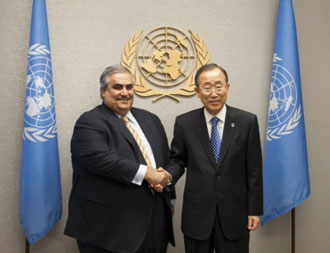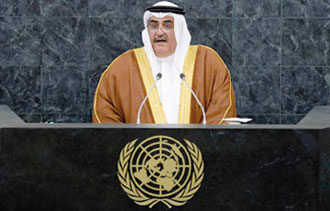
|
 |
 |
|
|
|
|
|
|
|
|
|
|
|
|
|
|
|
|
|
|
|
|
|
|
Bahrain is Committed to Human RightsIn his speech on 30 September 2013, before the UN General Assembly, the Minister of Foreign Affairs Sheikh Khalid bin Ahmad Al- Khalifa stated that ‘Bahrain is keen on cooperation with national and international civil society organizations, and in particular those operating in the field of Human Rights, through continuous dialogue and a meaningful exchange of experiences and expertise away from confrontation as we are all parties to the same cause in which we all believe in , namely, the promotion , respect and protection of human rights’.
The Minister said that his country works within three strategic pillars, one of which is to realize the aspirations of all Bahrainis. This includes raising the standards of living, achieving peace and security, respecting human rights through the consolidation of the principles of pluralism, democracy and political participation. He added that ‘the Bahraini leadership is keen on interacting and engaging with its people and on responding to their aspiration with full commitment and transparency. The Minister went on to say that ‘the Kingdom continues to pursue its firm policy of laying down the foundations of the modern independent sovereign state that are based on justice, constitutional and legislative reforms , human rights and the enhancement of the role of women’. The Minister continued by saying that his country ‘has achieved tangible results in the field of enhancing human rights, notably the establishment of the Commission of Prisoners and Detainees, the establishment of the National Fund to compensate those affected by events, the establishment of the Ombudsman within the Ministry of Interior operating as an autonomous body within the laws of the land, and the professional standards of police service as stipulated in the police code of conduct’. He also pointed to Bahrain’s proposal to create an Arab Human Rights Court, a proposal that was endorsed by the Arab Summit Meeting held in Qatar in March 2013 in response to the aspirations of the Arab peoples. This constitutes a qualitative stride in the region and comes as a consolidation of the principle of the rule of law and in line with the procedures followed by similar courts in other parts of the world. He also expressed hope that this court will lay down the solid foundation for the protection of human rights in the Arab world. Sheikh Khalifa also stressed that the public awareness among its citizens has shielded Bahrain from the sort of sectarian tensions and conflicts witnessed in many other countries, without mentioning Iraq and Syria. However, these two countries were mentioned later on in his speech in response to a comment made by the American President who linked Bahrain to Iraq and Syria in his address before the UN General Assembly. The Minister highlighted that all through its long history Bahrain has chosen the path of tolerance, moderation and social coexistence among its various sects, ethnics and religious groups, in a manner that has kept at bay any sectarian tensions or conflicts such as those blighting Iraq and Syria today. The Minister also met with the UN Secretary General Ban Ki Moon who called, in a statement issued by his office, on Bahrain to respect human rights and to make good use of the assistance available at the United Nations human rights bodies, in a reference perhaps to the technical assistance that could be extended to Bahrain by the Office of the UN High Commission for Human Rights, which has expressed it’s readiness in that respect during a visit by its delegation to Bahrain in December 2012. The Secretary-General also welcomed the commitment of H.M. King Hamad to dialogue and reform and called on the Government to engage in a meaningful and all-inclusive National Dialogue that meets the legitimate aspirations for reform shared by all sects of the Bahraini community. He also expressed hope that Bahrain would continue to respond generously to the United Nations humanitarian appeals launched to meet the needs of Syrian refugees. |

